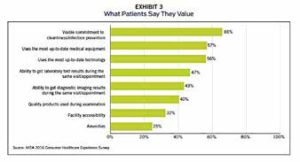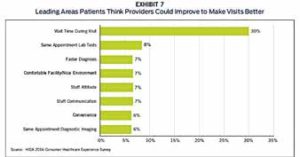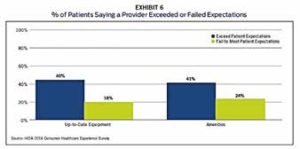By Gina Smith, CMRP, AMS, Director of Business Development, HIDA
Patients are carefully evaluating the medical care they receive more than ever before. With rising financial pressures and greater access to information, patients are making decisions about their medical care in the same way they do for other consumer goods and services. Suppliers are well positioned to help their provider customers address many of the most common patient concerns.
HIDA’s new Horizon Report Patient Satisfaction: How Medical Products Improve Consumer Experience, draws on our nationwide survey of over 1,000 patients on their recent experiences with healthcare providers. The survey found that medical products can play an important role in improving how patients rate their providers. Among the key findings:
- Cleanliness is key. Nearly two-thirds of patients highly value providers who demonstrate a commitment to cleanliness. Patients pay close attention to their surroundings during provider visits, and these evaluations help them determine whether or not they will be likely to return. Respondents said that signs of a provider’s commitment to cleanliness include providing face masks to sick patients, availability of hand sanitizer gel and other cleaning products, and the presence of infection control signage throughout the building.
- Patients want fast results. Wait times – to receive care, to receive lab results, and to get a diagnosis – were the three leading causes of patient dissatisfaction. Patients expressed frustration with having to visit their providers multiple times to obtain diagnostic tests. One respondent commented that long wait times make her “feel like [providers] do not value my time.” Providers who can get results to patients faster will enjoy a competitive edge.
- Patients value up-to-date equipment and technology. Patients value environments that inspire a high level of confidence in the care they will receive. Up-to-date equipment and technology are key drivers of this confidence and were among the top five reasons providers exceeded patient expectations. Patient confidence will become even more important in the coming years, since younger patients are three times less loyal to their providers than their older counterparts.
Physicians and other providers will need to carefully think about how they can demonstrate value to patients while keeping them satisfied. Smart suppliers can use patient preferences to help determine how they can be part of the solution. To read the full report and to access other HIDA Research & Analytics reports, visit www.HIDA.org/HorizonReport.


